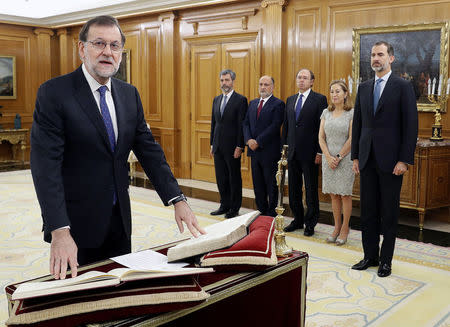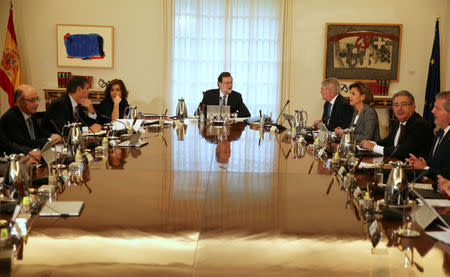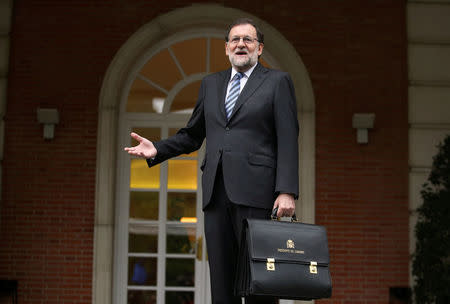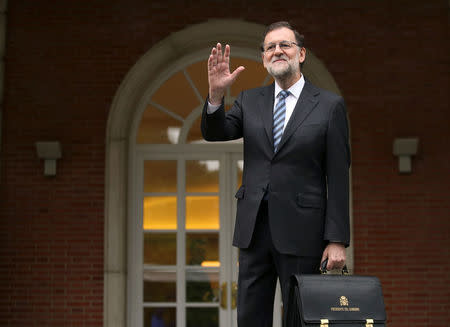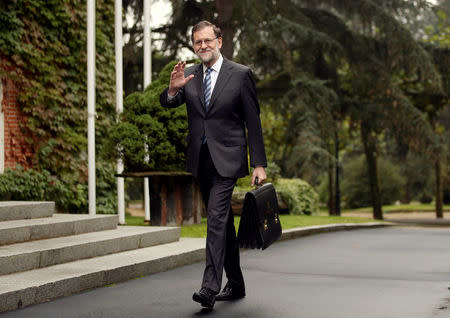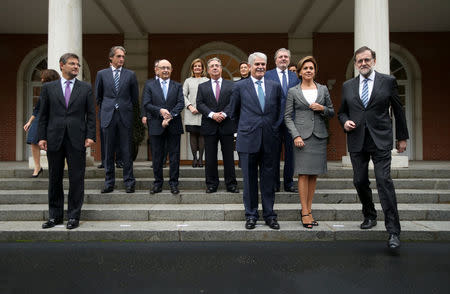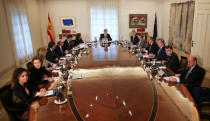Cabinet reshaped by Spain's Rajoy draws strong opposition criticism
By Adrian Croft and Jesús Aguado MADRID (Reuters) - Spanish Prime Minister Mariano Rajoy brought six new ministers into his cabinet on Thursday but opposition leaders said his new team showed no sign of being open to the dialogue his minority government will need to survive. The conservative Rajoy named a new, younger 13-member cabinet, including five women, for his second term after he won a parliamentary confidence vote on Saturday, ending 10 months of political paralysis that included two inconclusive elections. But Rajoy's lineup was strongly criticized by opposition parties, which said it would pursue the same austerity policies as before and seemed disinclined to negotiations Rajoy has promised to win support for his legislation. "It is a government that is not qualified for dialogue," Socialist spokesman Mario Jimenez told reporters. Rajoy retained trusted confidants like Deputy Prime Minister Soraya Saenz de Santamaria, who will take charge of relations with Spain's autonomous regions at a time when the wealthy northeastern Catalonia region plans an independence referendum. He gave an expanded role to Economy Minister Luis de Guindos, handing him the industry portfolio as well, but kept Cristobal Montoro as budget minister, dashing expectations that he might create one powerful economy and finance ministry. The cabinet is drawn mainly from Rajoy's Popular Party (PP), with no gesture to rivals such as appointing a true independent. Unless it can get parties such as the Socialists on board, Rajoy's government will have problems passing its budget and other laws, and analysts say it might not survive a full term. Anti-austerity Podemos, the third biggest party in parliament, also condemned the cabinet, predicting it would push through more public spending cuts. "With this government, the cuts, insecurity and social suffering are going to continue," said Rafa Mayoral, a Podemos legislator. QUESTIONS ABOUT POLICY COORDINATION Political risk consultants Teneo Intelligence said the continued split between the budget and economy portfolios "bodes badly for the coordination of economic policy and fiscal consolidation." Rajoy, 61, governed with an absolute majority between 2011 and 2015, a period when unemployment peaked at 27 percent and Spain's banks needed a 41 billion euro ($45 billion) European bailout, but he must now adapt to a new political reality. The PP won two elections in December 2015 and June but without a majority. De Guindos is generally respected by his counterparts abroad after steering Spain out of recession and into a strong recovery during Rajoy's first term. The 2017 budget will be one of the new government's top priorities. Spain, the euro zone's fourth biggest economy, needs to shrink its budget deficit to 3.1 percent of output in 2017 from an expected 4.6 percent this year to meet targets agreed with Brussels. That may require 5 billion euros of spending cuts or higher taxes. PP Secretary-General Maria Dolores de Cospedal was given a cabinet post for the first time, as defense minister. Rajoy replaced 72-year-old Foreign Minister Jose Manuel Garcia-Margallo with Alfonso Dastis, Spain's ambassador to the EU, reflecting Madrid's wish to play a more prominent role on the European stage at a time when there will be negotiations on Britain's exit from the bloc. Rajoy will be able to count on backing from the liberal Ciudadanos (Citizens) party, the fourth-largest group in parliament, on 150 previously agreed measures to tackle political corruption and reform the electoral system. But even with Ciudadanos' backing, Rajoy's PP lacks a majority. (Additional reporting by Sarah White, Inmaculada Sanz, Carlos Ruano and Rodrigo de Miguel; Editing by Mark Heinrich)

 Yahoo News
Yahoo News 